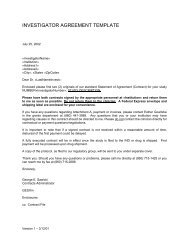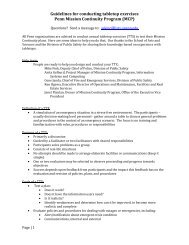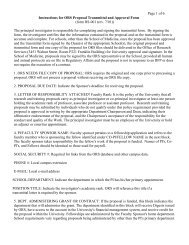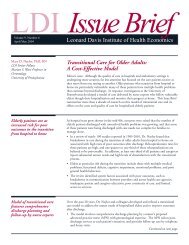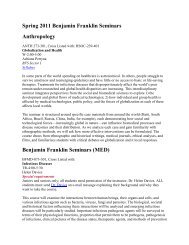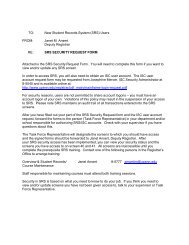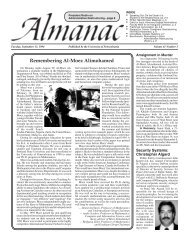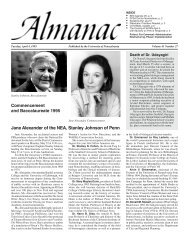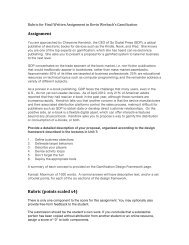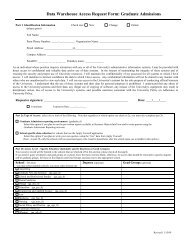No. 5 September 24, 1991 - University of Pennsylvania
No. 5 September 24, 1991 - University of Pennsylvania
No. 5 September 24, 1991 - University of Pennsylvania
Create successful ePaper yourself
Turn your PDF publications into a flip-book with our unique Google optimized e-Paper software.
SENATE<br />
From the Senate Office<br />
The following agenda is published in accordance with the Senate Rules.<br />
Agenda <strong>of</strong> Senate Executive Committee Meeting<br />
Wednesday, October 2, <strong>1991</strong>, 3-5:30 p.m.<br />
1. Approval <strong>of</strong> the minutes <strong>of</strong> <strong>September</strong> 11, <strong>1991</strong><br />
2. Chair’s Report<br />
3. <strong>No</strong>minations to Senate <strong>No</strong>minating Committee<br />
4. Discussion with Provost Aiken <strong>of</strong> the Academic Planning and Budget<br />
Committee’s agenda for <strong>1991</strong>-92, including faculty salaries<br />
5. Procedure <strong>of</strong> consultative committees<br />
6. AAUP letter regarding misconduct procedures<br />
7. Discussion <strong>of</strong> faculty appointment to the Affirmative Action Council<br />
8. Other new business<br />
9. Adjournment by 5:30 p.m.<br />
Questions can be directed to Carolyn Burdon, Executive Assistant to the<br />
Chair <strong>of</strong> the Faculty Senate, Ext. 8-6943.<br />
OF RECORD<br />
The following is a reiteration by the President <strong>of</strong> a policy<br />
published May 7, <strong>1991</strong>.<br />
Eleemosynary Policy<br />
The <strong>University</strong> has had a policy since at least 1986 <strong>of</strong> not making<br />
charitable contributions from <strong>University</strong> funds to other eleemosynary<br />
organizations (i.e., any organization supported by charitable giving regardless<br />
<strong>of</strong> tax-exempt status), unless a written waiver is granted by the<br />
President. Because Penn solicits gifts for educational and research purposes<br />
<strong>of</strong> the <strong>University</strong>, it is inappropriate to transfer those funds to other uses<br />
or organizations, no matter how worthy. In light <strong>of</strong> the current budgetary<br />
situation, I wish to reaffirm this policy: payments by the <strong>University</strong> to<br />
other eleemosynary organizations in the form <strong>of</strong> a gift or contribution are<br />
prohibited unless approved in writing by the President. Effective July 1,<br />
<strong>1991</strong>, I will no longer grant such waivers.<br />
—Sheldon Hackney<br />
FOR COMMENT<br />
To the <strong>University</strong> Community:<br />
As part <strong>of</strong> our ongoing efforts to foster ethical and equitable academic and employment environments,<br />
we are pleased to re-publish for comment, this proposed Acquaintance Rape and Sexual Violence Policy<br />
first published in Almanac July 16, <strong>1991</strong>. The new policy will be an important addition to existing<br />
policies including the Sexual Harassment, Racial Harassment and General Conduct policies.<br />
Please review the Policy and send comments and recommendations by October 2, <strong>1991</strong>,<br />
to me at 200 Houston Hall/6306. —Kim Morrisson, Vice Provost for <strong>University</strong> Life<br />
Acquaintance Rape and Sexual Violence Policy<br />
Introduction<br />
The <strong>University</strong> <strong>of</strong> <strong>Pennsylvania</strong> seeks a safe and healthy environment<br />
for all community members and visitors. Thus, Penn has developed the<br />
following policy on acquaintance rape/sexual violence to set forth definitions,<br />
to reaffirm Penn’s commitment to providing resources and processes<br />
for prevention, education, support, reporting, adjudication, protection from<br />
retaliation, and to identify the range <strong>of</strong> sanctions. The <strong>University</strong> will also<br />
provide multiple access points for collection <strong>of</strong> information about incidents<br />
and a clear process for dissemination <strong>of</strong> acquaintance rape/sexual violence<br />
statistics to the community.<br />
The <strong>University</strong> needs a specific policy on rape and sexual violence<br />
because the prevalence <strong>of</strong> rape and sexual violence on college campuses<br />
is alarming.<br />
Statistics compel universities throughout the country to acknowledge<br />
that significant numbers <strong>of</strong> their members have been raped or will be<br />
raped. 1 Given Penn’s history <strong>of</strong> providing national leadership with respect<br />
to rape and sexual assault education and counseling, it is timely for Penn to<br />
continue this role by adopting a specific policy on acquaintance rape and<br />
sexual violence. The personal trauma experienced by the victims/survivors<br />
and the nature and consequences <strong>of</strong> this crime undermine the trust essential<br />
to the process <strong>of</strong> education and the mission <strong>of</strong> the <strong>University</strong>. This crime<br />
also conflicts with our very basic standards <strong>of</strong> behavior. Indeed, this form<br />
<strong>of</strong> sexual violence is particularly damaging to our community because<br />
victims/survivors <strong>of</strong>ten are acquainted with and must continue to interact<br />
with their assailants. Moreover, for many men and women it is difficult<br />
to define this behavior as rape.<br />
1<br />
In a study <strong>of</strong> 32 colleges and universities, one in four college women reported<br />
being a victim <strong>of</strong> rape or attempted rape during the preceding year.<br />
Eighty-four percent <strong>of</strong> these victims/survivors were acquainted with their<br />
assailants.<br />
—The National Institute <strong>of</strong> Mental Health (NIMH),<br />
“Ms.”, Project on Sexual Assault, 1987.<br />
Definition<br />
Acquaintance rape is a form <strong>of</strong> sexual violence. For the purpose <strong>of</strong><br />
this policy, acquaintance rape/sexual violence is defined as any act in<br />
which a member <strong>of</strong> the university community forces another with whom<br />
he or she is acquainted to engage in sexual activity against her or his<br />
will or without her or his consent. Assent shall not constitute consent<br />
if it is given by a person who because <strong>of</strong> youth, mental disability or<br />
intoxication is unable to make a reasonable judgment concerning the<br />
nature <strong>of</strong> or harmfulness <strong>of</strong> the activity. This policy applies to groups<br />
as well as individuals.<br />
Intervention<br />
The <strong>University</strong> <strong>of</strong> <strong>Pennsylvania</strong> will provide resources to support<br />
victims/survivors, will utilize <strong>University</strong> fact-finding and disciplinary<br />
procedures with appropriate jurisdiction, will publish annual statistics<br />
on incidents <strong>of</strong> acquaintance rape and other forms <strong>of</strong> sexual violence,<br />
and will provide comprehensive education for the prevention <strong>of</strong> sexual<br />
violence including acquaintance rape at the <strong>University</strong> <strong>of</strong> <strong>Pennsylvania</strong>.<br />
Incidents reported to the appropriate departments will be addressed<br />
promptly and will be treated confidentially. In addition, the <strong>University</strong><br />
will, as appropriate, inform members <strong>of</strong> the Penn community when an<br />
incident has been so reported. The procedures which implement this<br />
policy will take into account the need to investigate charges which may<br />
be filed and the right to confidentiality <strong>of</strong> all involved parties. When<br />
appropriate, after an incident occurs, outreach and support to faculty,<br />
students and staff affected by the particular incident will be part <strong>of</strong><br />
Penn’s response. This support may include release time, leaves, or<br />
other accommodations.<br />
Sanctions<br />
<strong>University</strong> sanctions will be imposed in accordance with appropriate<br />
<strong>University</strong> processes upon persons found to have violated this policy.<br />
These sanctions can include but are not limited to suspension, expulsion,<br />
and/or separation from the <strong>University</strong>. In addition, an individual charged<br />
may be subject to prosecution by the Office <strong>of</strong> the District Attorney under<br />
<strong>Pennsylvania</strong> Criminal Statutes.<br />
ALMANAC <strong>September</strong> <strong>24</strong>, <strong>1991</strong>




